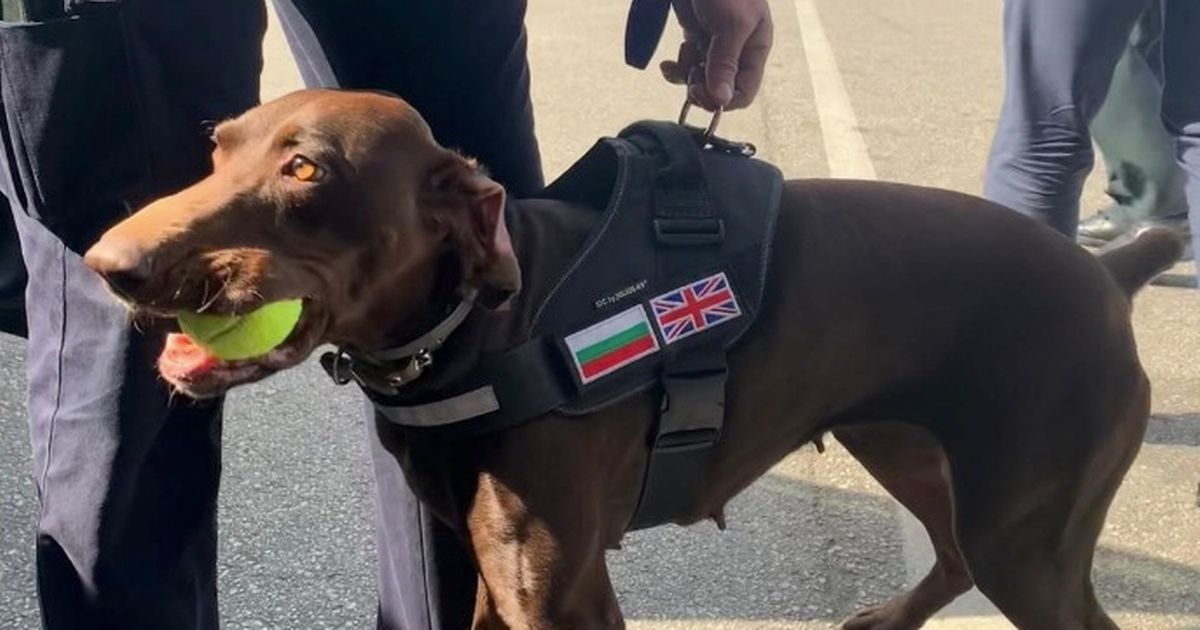The short-haired pointer has cost organised crime gangs millions in profits by helping to track down 76 illegal vessels on world’s second busiest border between Bulgaria and Turkey
A British sniffer dog has cost Channel smuggling gangs millions in profits after helping to seize 76 illegal boats in the biggest operation of its kind.
Adele has been stationed at the world’s second busiest land border between Bulgaria and Turkey detecting equipment which the trafficking gangs try to smuggle into Europe. The short-haired pointer was trained by the National Crime Agency to sniff out the rubber of people smugglers’ dinghies hidden in lorries.
The NCA, working with international partners, have seized 76 vessels so far this year. Officers carried out an intensification operation last week alongside Home Office, HMRC and Foreign Office officials and the Bulgarian authorities.
READ MORE: Hero train steward wakes in hospital after mass train stabbing in major updateREAD MORE: Harvey Willgoose’s mum says hurtful socials and TikTok have been ‘killing’ her
A number of illegal migrants were found during searches of 350 freight and passenger vehicles at the Kapitan Andreevo border checkpoint over a 48-hour period.
Can Gunal, NCA international liaison officer, said: “Adele is an important part of our armoury in the fight against people smuggling networks who use the Bulgarian border to transfer equipment used in dangerous channel crossings. She has also detected other illegal commodities and criminal cash.”
Julie Roper, who led the NCA operation, said: “Every time we take a boat out we have stopped a crossing and have saved people from potentially drowning. These vessels are not fit for purpose.”
Among gang leaders who have used the smuggling route was Hewa Rahimpur, 32, who was jailed in Belgium for 11 years. Rahimpur headed one of the largest human trafficking gangs involved in smuggling people across the English Channel.
Police believe he masterminded a ring that brought 10,000 people to the UK in small boats. Rahimpur arrived in Britain in 2016 and claimed asylum, saying that as an Iranian Kurd he would face persecution at home. He was allowed to stay in 2020.
The gangmaster set up a barber’s shop in London but then used Britain as a base for a far-reaching criminal operation. He led a group that sourced boats, engines and life-jackets for migrant crossings. They bought engines and parts from Turkey and China and transported it through Germany, Belgium and the Netherlands.
Last week UK officers gathered forensics on boats that had previously been seized, helping to build on intelligence against organised crime groups like the one run by Rahimpur. They also gave extensive training for overseas law enforcement partners, including digital and covert tactics.
The intensification also focused on other illegal smuggling including drugs, illegal tobacco, cash and counterfeit goods. It comes after similar operations this year saw the seizure of 20 boats on 10 August and 26 on 26 July.
Regional Head of Investigations Jacque Beer said: “Bulgaria is a vital entry point for the supply routes used by the criminal people smuggling networks who organise highly dangerous Channel boat crossings. The intelligence we gathered will support our aim of preventing deadly boats and weak engines being used at sea where lives are put in peril. The UK’s close partnership with Bulgaria and other overseas partners helps us to work together to crack down on organised immigration crime and illegal migration in an intelligence-led way, and make our borders more secure.”
Philip Nikolov, of the Bulgarian Border Customs Police, said: “The opportunity to collaborate with our international partners is of paramount importance to us. It is only through the exchange of information, synchronised practices, and joint action that we can effectively counter cross-border smuggling and crime, and ensure a safer Europe and the United Kingdom.
“Our partnership consistently yields tangible results, which manifest themselves in lives saved, cleaner business environments, and a more humane society.”

